California became the 2nd American state — and the 7th government in the world — to offer legal marriage to same-sex couples on May 15, 2008.
As a result of a suit, married, same-sex couples would have finally been treated as next-of-kin in California.
On November 4, 2008, Proposition 8 was narrowly won, which gutted the right of same-sex couples to marry by amending the state constitution. Three suits were quickly launched to stop the evisceration of civil rights. Licenses were still being issued by some county clerks until the California Secretary of State published the official final election results on December 9, 2008.
18,000 same-sex couples obtained a marriage license by November 6, 2008.
Those who obtained a license continue to have it honored in California.
On May 26, 2009, the California Supreme Court ruled that the Proposition was constitutional and that one segment of citizens could deny equal rights to another group of citizens.
On August 12, 2010, Judge Walker ruled that Proposition 8 was unconstitutional, violating both the Due Process and Equal Protection clauses of the U.S. Constitution, and denied a motion to stay the ruling throughout the appeals process.
On August 16, 2010, the 9th Circuit Court of Appeals granted the motion to stay, ordered expedited briefing on the merits of the appeal, and directed the parties to brief the issue of why the appeal should not be dismissed for lack of standing.
The Supreme Court dismissed an appeal over same-sex marriage on jurisdictional grounds, ruling private parties do not have “standing” to defend California’s voter-approved ballot measure barring same-sex couples from state-sanctioned wedlock. The ruling cleared the way for same-sex marriages in California to resume.
On August 14, 2013, the Supreme Court denied the petition for a writ of mandate, and the last attempt to resusitate the anti-gay, anti-marriage Proposition 8 thereby failed.
| The Suit |
In re Marriage Cases
|
This case consolidated these suit appeals: • City and County of San Francisco v. State of California (A110449 [Super. Ct. S.F. City & County, No. CGC-04-429539]) • Tyler v. State of California (A110450 [Super. Ct. L.A. County, No. BS-088506]) • Woo v. Lockyer (A110451 [Super. Ct. S.F. City & County, No. CPF-04-504038]) • Clinton v. State of California (A110463 [Super. Ct. S.F. City & County, No. CGC-04-429548]) • Proposition 22 Legal Defense and Education Fund v. City and County of San Francisco (A110651 [Super. Ct. S.F. City & County, No. CPF-04-503943]) • Campaign for California Families v. Newsom (A110652 [Super. Ct. S.F. City & County, No. CGC-04-428794]) |
On May 15, 2008, the California Supreme Court ruled (4-3) that it is unconstitutional to exclude same-sex couples from legal marriage, even if such couples are granted the right to enter into Domestic Partnerships or Civil Unions, which provide most, or even all, of the same rights as legal marriage. The Court was comprised of six out of seven Republican-appointed judges.
The majority opinion, by Chief Justice Ronald M. George, declared that any law that discriminates on the basis of sexual orientation will be constitutionally suspect in California, in the same way as laws that discriminate by race or gender, thus making the California ruling the first in the nation to adopt such an all-encompassing standard.
The California Supreme court’s decision cannot be appealed. It has the final say in cases brought under the California constitution, and it will stand as long as the constitution provides equal protection.
Historical notes:
The very first legal suit in California was launched by Benjamin and Marcial Cable-McCarthy on April 18, 1993. The case, Cable-McCarthy v. California, lost and was denied a review on appeal to the California Supreme Court.
One of the marriage cases was named after its lead couple, Lancy Woo and Cristy Chung. They were together from 1988-2006. They have a daughter, Olivia, born in 1998. In May 2006, they removed themselves from the case.
Polls and civil rights:
California polls have found substantial support for same-sex marriage. While there was a referendum passed in 2000 limiting marriage only to opposite-sex couples, five years later, the state legislature had twice approved a bill to include same-sex couples in their marriage laws. It was the first legislature to do so without a court order compelling them. Both times, the bill was vetoed by California Gov. Arnold Schwarzenegger, who said that he vetoed it because he believed “it is up to the state Supreme Court” to decide the issue.
Thus, even leaving aside constitutional guarantees — which, in a constitutional republic, override public opinion — the ruling is consistent with that state’s democratic processes and public opinion.
The court stated that the language of section 300 (which limits marriage to a union “between a man and a woman”) and 308.5 (which limits marriage to opposite-sex couples) are unconstitutional and must be stricken from the statute, and that the remaining statutory language must be understood as making the designation of marriage available both to opposite-sex and same-sex couples.
The ruling focused on what the court called “the substantive right of two adults who share a loving relationship to join together to establish an officially recognized family of their own — and, if the couple chooses, to raise children within that family — constitutes a vitally important attribute of the fundamental interest in liberty and personal autonomy that the California Constitution secures to all persons for the benefit of both the individual and society.”
|
California Court Marriage Finding Excerpt In re Marriage Cases [Six consolidated appeals] May 15, 2008 |
|
“Furthermore, in contrast to earlier times, our state now recognizes that an individual’s capacity to establish a loving and long-term committed relationship with another person and responsibly to care for and raise children does not depend upon the individual’s sexual orientation, and, more generally, that an individual’s sexual orientation — like a person’s race or gender — does not constitute a legitimate basis upon which to deny or withhold legal rights. We therefore conclude that in view of the substance and significance of the fundamental constitutional right to form a family relationship, the California Constitution properly must be interpreted to guarantee this basic civil right to all Californians, whether gay or heterosexual, and to same-sex couples as well as to opposite-sex couples.” “Under the strict scrutiny standard, unlike the rational basis standard, in order to demonstrate the constitutional validity of a challenged statutory classification the state must establish (1) that the state interest intended to be served by the differential treatment not only is a constitutionally legitimate interest, but is a compelling state interest, and (2) that the differential treatment not only is reasonably related to but is necessary to serve that compelling state interest. Applying this standard to the statutory classification here at issue, we conclude that the purpose underlying differential treatment of opposite-sex and same-sex couples embodied in California’s current marriage statutes — the interest in retaining the traditional and well-established definition of marriage — cannot properly be viewed as a compelling state interest for purposes of the equal protection clause, or as necessary to serve such an interest. “A number of factors lead us to this conclusion. First, the exclusion of same-sex couples from the designation of marriage clearly is not necessary in order to afford full protection to all of the rights and benefits that currently are enjoyed by married opposite-sex couples; permitting same-sex couples access to the designation of marriage will not deprive opposite-sex couples of any rights and will not alter the legal framework of the institution of marriage, because same-sex couples who choose to marry will be subject to the same obligations and duties that currently are imposed on married opposite-sex couples. Second, retaining the traditional definition of marriage and affording same-sex couples only a separate and differently named family relationship will, as a realistic matter, impose appreciable harm on same-sex couples and their children, because denying such couples access to the familiar and highly favored designation of marriage is likely to cast doubt on whether the official family relationship of same-sex couples enjoys dignity equal to that of opposite-sex couples. Third, because of the widespread disparagement that gay individuals historically have faced, it is all the more probable that excluding same-sex couples from the legal institution of marriage is likely to be viewed as reflecting an official view that their committed relationships are of lesser stature than the comparable relationships of opposite-sex couples. “Finally, retaining the designation of marriage exclusively for opposite-sex couples and providing only a separate and distinct designation for same-sex couples may well have the effect of perpetuating a more general premise — now emphatically rejected by this state — that gay individuals and same-sex couples are in some respects ‘second-class citizens’ who may, under the law, be treated differently from, and less favorably than, heterosexual individuals or opposite-sex couples. Under these circumstances, we cannot find that retention of the traditional definition of marriage constitutes a compelling state interest. Accordingly, we conclude that to the extent the current California statutory provisions limit marriage to opposite-sex couples, these statutes are unconstitutional.” Click here for the entire ruling (172-page PDF file): California Court Finding
|
| Events Following Winning the Suit |
- On May 15, 2008, Gov. Arnold Schwarzenegger issued this statement:
“I respect the Court’s decision and as Governor, I will uphold its ruling. As I have said in the past, I will not support an amendment to the constitution that would overturn this state Supreme Court ruling.”
- On May 15, 2008, Los Angeles Mayor Antonio Villaraigosa hailed the California Supreme Court decision, saying he would officiate over as many same-sex weddings as possible. The mayor stood by leaders of the gay and lesbian community in the courtyard of L.A.’s Gay and Lesbian Community Center, calling the high court’s decision a victory for California. He pledged his full support to campaign against attempts to amend the state constitution:
“It’s been a long journey to reach this historic day. This is about people and the right for people to love who they want.”
“I will stand with you. I will do everything in my power to keep this decision the law of the land.” - Karen Bass (D-Los Angeles), California Assembly speaker:
“We are delighted with today’s state Supreme Court ruling allowing marriage equality in California. It is a true testament to advancing equality and to recognizing the right of all Californians to build a future with the person they love. We recently lost Mildred Loving, the woman whose marriage to a man of another race ushered in the Supreme Court ruling that made marriage colorblind. Today’s ruling is another important reminder that love will overcome.”
- Don Perata (D-Oakland), California Senate president pro temp:
“I’m glad the Supreme Court validated what I consider a fundamental premise of our nation, that all people deserve equal protection under the law. … This is a happy and historic day because all Californians, regardless of sexual orientation, now have the right to marry.”
- Also on May 15, 2008, many anti-gay, right-wing, extremist groups denounced the ruling, including the California Family Council (Sacramento and Riverside), Focus on the Family Action (public policy wing of Focus on the Family (Colorado Springs)), Liberty Counsel (Florida, Virginia and Washington, D.C.), and the state’s Catholic bishops.
- Radical, right-wing groups — which received significant funding from out-of-state — hope to amend the California constitution to eliminate fundamental protections and take away the basis for the pro-marriage decision. In May 2008, these groups began efforts to place Proposition 8 on the November 2008 ballot that asks voters to amend the California constitution to reverse the court’s decision, and deny same-sex couples the freedom to marry. The largest amount of money was donated by the Mormon Church — nearly $188,000 — a repeat of their efforts to help alter the states constitutions of Hawaii and Alaska to deny legal marriage, a right that had also been won in court in those states.
In a public statement on April 11, 2008, Governor Schwarzenegger stated that an initiative to amend the California Constitution to ban same-sex couples from marriage was “a waste of time,” and added “I will always be there to fight against that. It will never happen.”
- On November 5, 2008, Proposition 8 narrowly won, which gutted the right of same-sex couples to marry by amending the state constitution. Six suits were quickly launched to stop the evisceration of civil rights.
It was reported that the California Attorney General said the state will continue to honor the marriages of the 18,000 lesbian and gay couples who have already married in California.
- On November 5, 2008, the National Center for Lesbian Rights, the American Civil Liberties Union, and Lambda Legal filed a lawsuit — Strauss v. Horton — challenging the validity of Proposition 8 in the California Supreme Court on behalf of six couples and Equality California.
The City of San Francisco, the city and County of Los Angeles, and Santa Clara County, filed a similar challenge, as did a private attorney in Los Angeles.
The lawsuits allege that Proposition 8 was an improper revision, not merely an amendment, of the California Constitution because, in its very title, which was “Eliminates the right to marry for same-sex couples,” the initiative eliminated an existing right only for a targeted minority — lesbian and gay Californians. It also improperly attempts to prevent the courts from exercising their essential constitutional role of protecting the equal protection rights of minorities.
If permitted to stand, Proposition 8 would be the first time an initiative successfully changed the California Constitution to remove an existing right only for a particular group. Such a change would defeat the purpose of a constitution and fundamentally alter the role of the courts in protecting minority rights. According to the California Constitution, such a serious revision of our state Constitution cannot be enacted through a simple majority vote, but must first be approved by two-thirds of the Legislature.
- In a petition filed on November 14, 2008, leading African American, Latino, and Asian American groups argued that Proposition 8 threatens the equal protection rights of all Californians.
- On November 17, 2008, the California Council of Churches and other religious leaders and faith organizations representing millions of members statewide, also filed a petition asserting that Proposition 8 poses a severe threat to the guarantee of equal protection for all, and was not enacted through the constitutionally required process for such a dramatic change to the California Constitution.
- Also on November 17, 2008, prominent California women’s rights organizations filed a petition asking the Court to invalidate Proposition 8 because of its potentially disastrous implications for women and other groups that face discrimination.
- On November 19, 2008, the Court agreed to hear Strauss v. Horton and set an expedited briefing schedule. The Court also denied an immediate stay.
Over the past 100 years, the California Supreme Court has heard nine cases challenging either legislative enactments or initiatives as bogus revisions of the California Constitution. In three of those cases, the Court invalidated those measures.
The court struck down an improper voter initiative in 1990, which would have added a provision to the California Constitution stating that the “Constitution shall not be construed by the courts to afford greater rights to criminal defendants than those afforded by the Constitution of the United States.” That measure was invalid because it improperly attempted to strip California’s courts of their role as independent interpreters of the state’s constitution.
- On May 26, 2009, the California Supreme Court posted its ruling that the proposition was constitutional and that one segment of citizens could deny equal rights to another group of citizens.
The 18,000 California same-sex couples who married before Prop 8 remain married.
- On August 12, 2010, Judge Walker ruled that Proposition 8 was unconstitutional, violating both the Due Process and Equal Protection clauses of the U.S. Constitution, and denied a motion to stay the ruling throughout the appeals process.
- On August 16, 2010, the 9th Circuit Court of Appeals granted the motion to stay, ordered expedited briefing on the merits of the appeal, and directed the parties to brief the issue of why the appeal should not be dismissed for lack of standing.
- The Supreme Court dismissed an appeal over same-sex marriage on jurisdictional grounds, ruling private parties do not have “standing” to defend California’s voter-approved ballot measure barring same-sex couples from state-sanctioned wedlock. The ruling cleared the way for same-sex marriages in California to resume.
- On August 14, 2013, the Supreme Court denied the petition for a writ of mandate, and the last attempt to resusitate the anti-gay, anti-marriage Proposition 8 thereby failed.
| The Suit Couples |
| The Couples from In re Marriage Cases | |
|
Originally sued under Tyler v. State of California. Photos courtesy of the couples. | |

|
• Robin Tyler and Diane Olson. Together since 1993. They were friends since 1973. |
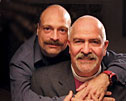
|
• Rev. Troy Perry and Phillip Ray DeBlieck. Together since 1985. Had a legal marriage in canada. |
|
Originally sued under Woo v. Lockyer. Photos courtesy the National Center for Lesbian Rights. | |
| No photo available. |
• Lancy Woo and Cristy Chung Together 1988-2006. They have a daughter, Olivia, born in 1998. They removed themselves from the case in May 2006. |

|
• Joshua Rymer and Timothy Frazer. Together since 1994. They exchanged wedding rings in 1995. |
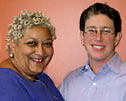
|
• Jewelle Gomez and Diane Sabin. Together since 1993. |
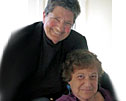
|
• Myra Beals and Ida Matson. Together since 1977. |
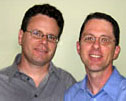
|
• Arthur Frederick Adams and Devin Wayne Baker. Together since 2001. |
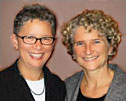
|
• Jeanne Rizzo and Pali Cooper. Together since 1989. They have a 28 year-old son, Christopher. |
|
Originally sued under other petitions. Photos courtesy the National Center for Lesbian Rights. | |
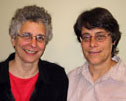
|
• Karen Shain and Jody Sokolower. Together since 1972. They have an 18 year-old daughter, Ericka. |
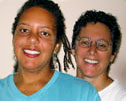
|
• Janet Wallace and Deborah Hart. Together since 1991. |
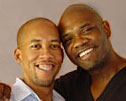
|
• Corey Davis and Andre LeJeune. Together since 1998. |
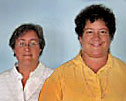
|
• Alexsis Beach and Rachel Lederman. Together since 1987. They have two sons, Izak and Raziel. |
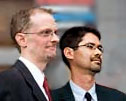
|
• John Lewis and Stuart Gaffney. Together since 1987. |
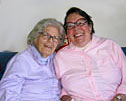
|
• Del Martin and Phyllis Lyon. Together since 1953. |
| No photo available. |
• Margot McShane and Alexandra D’Amario. Together since 2002. They have 3 children, 3 year-old twins (boy and girl) and a newborn boy. |

|
• Dave and Jeff Chandler. Together 1993. They have two sons, Taylor and Jacob. |
| No photo available. |
• Sarah and Gillian Conner-Smith. Together since 2000. |
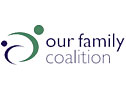
|
• Our Family Coalition. Promotes the rights and well-being of Bay Area LGBiT families with children and prospective parents. |

|
• Equality California. Working to keep marriage by fight the anti-gay anti-marriage ballot initiative. Fights to achieve equality and secure legal protections for LGBT people. |
| License Procedures |
| Recognition of Marriage License Held by Same-sex Couples |
Federal Recognition
- Some.
Previously, the Federal system did not recognize a same-sex marriage because of the DoMA law. SInce two major portions of that law have been ruled unconstitutional, there has been halting recognition, including within the military.
[See our article: U.S. Federal Laws for the Legally Married.]
- In California, yes.
If a company offers workplace benefits for opposite-sex couples who are married, they must offer those same benefits to same-sex couples. However, unlike opposite-sex couple, same-sex couples must pay federal taxes on those benefits.
- Outside California, depends, mostly none.
In states other than California some businesses may recognize the license for benefits.
New York, and likely Massachusetts, will recognize the marriage license.
[See the boxed information: States Recognizing a Marriage License below.]However, many states have indicated — via law suits — that they would NOT recognize the license for benefits, custody, or divorce.
Even if a state does not recognize your legal marriage, and will not grant you a legal divorce, for instance, you may still be held responsible for the obligations of marriage, such as providing financial support, or being held responsible for your former partner’s debts.
- No. Yes. Maybe.
On December 18, 2004 the Boston Globe reported that some of the largest employers in Massachusetts have decided not to extend health benefits to legal same-sex spouses of employees, saying their federally regulated health plans are not bound by the Massachusetts court ruling permitting same-sex marriage. NStar Corp., General Dynamics Corp., FedEx Corp., the Adecco temporary employment agency, and Caritas Christi Health Care are among those that do not provide the same medical benefits that they provide to spouses of opposite-sex married couples.
These employers provide benefits through “self-insured” medical plans, in which the employer, not an insurer, collects the premiums and pays the medical and hospital bills of its workers. These employers said they are not required to cover same-sex spouses because self-insured plans are regulated by federal law, which defines marriage as a union only between a man and a woman. According to Mercer Human Resource Consulting, 66 percent of large U.S. employers with more than 500 workers are self-insured.
Some businesses have welcomed the legal marriage licenses as proof for workplace benefits. However, other businesses, such as the Boston Medical Center, have dropped their domestic partner plans, and now require that couples get legally married to receive benefits.
| Warnings: Marriage Law Pitfalls |
Married in Canada or Massachusetts, or a Civil Union in Vermont
- The legally status is not yet clear for same-sex partners to marry in California if they already have a Vermont “Civil Union.”
- It is clear that same-sex partners may not marry in California if they already have a Vermont “Civil Union” with different partners. Civil Unions are a marriage-like, legal status under Vermont state law.
- If you have a Civil Union and the relationship is over, you will need to have a dissolution procedure. Courts outside of Vermont have usually not been willing to dissolve a Union. The only clearly established way to dissolve a Union is by living in Vermont for one year and filing for dissolution. Failure to do so before marrying in California could make you guilty of the crime of bigamy.
- If you were married in Canada, for instance, or Massachusetts, you are legally married no matter where you go. California will not marry a couple that is already married elsewhere.
Because most states will not recognize a same-sex marriage, divorces must be obtained in California, and possibly in Massachusetts.
We cannot recommend that non-resident couples get married in California, primarily because of the residency that is required to divorce. A judgment of dissolution of marriage may not be made unless one of the married parties has been a resident for six months, and residing in the county in which the proceeding is filed for at least three months.
- Because many states refuse to recognize a same-sex marriage license, should a couple have a falling-out, divorce would likely be impossible unless one of the partners moved to California.
- Besides the emotional reasons to dissolve a no-longer-functioning union, there are legal entanglements to consider. For instance, should one of the partners form a new relationship, they would not be able to sign up their new partner for workplace benefits. Most employers require an affidavit that stipulates that the partners are not married to anyone else or have another domestic partner.
Because many state laws forbid recognition of another state’s same-sex legal marriage license, a civil license would have little or no legal meaning.
It is possible that a California couple would get married, then move elsewhere. While it is certain that the Federal system will refuse to recognize the license, it is now known that most states will likewise refuse to recognize it.
For instance, on December 7, 2007, the Rhode Island Supreme Court ruled that the State Family Court cannot recognize the couple’s legal marriage in Massachusetts, at least for purposes of divorce. Cassandra Ormiston and Margaret Chambers, a Rhode Island same-sex couple, married in Fall River, Massachusetts in 2004, and sought a divorce in Rhode Island Family Court in October 2006.
Suing for Rights
Suing states for recognition is a highly expensive process, often taking years. Also, it should not be attempted without consulting national gay organizations with experience and knowledge of individual state law. The possibility of putting more “bad” law — that is, negative rulings — in place is extremely high, which could further entrench anti-marriage, anti-gay laws.
We recommend working with state and countrywide groups that have had a long track record in education as well as lobbying for equal rights.
| Also see: |
|
| Governments that offer Full Legal Marriage | ||
|
Nations . Netherlands (2001) Belgium (2003) Canada (2005) Spain (2005) South Africa (2005) Norway (2009) Sweden (2009) Iceland (2010) Argentina (2010) Portugal (2010) Denmark (2012) France (2013) New Zealand (2013) Brazil (2013) Uruguay (2013) New Zealand (2013) United Kingdom (England, Wales) (2013) Luxembourg (2014) Finland (2014) Scotland (2014) Ireland (2015) Greenland (2015) United States (2015) Colombia (2016) Germany (2017) Malta (2017) Australia (2017) Austria (2019) Taiwan (2019) Ecuador (2019) Costa Rica (2020) Chile (2022) Estonia (2023) Nepal (2023) Greece (2024) |
US States . U.S. Supreme Court, June 26, 2015 Ruling: All States must allow legal, same-sex marriage. . These states had legal marriage before the ruling: . Massachusetts (2004) California (2008) Connecticut (2008) Iowa (2009) Vermont (2009) New Hampshire (2009) District of Columbia (2009) New York (2011) Maine (2012) Washington (2012) Maryland (2013) Rhode Island (2013) Delaware (2013) Minnesota (2013) Illinois (2013) Utah (2013) New Jersey (2013) Hawaii (2013) New Mexico (2013) Michigan (2014) - stayed pending legal challenge Oregon (2014) Wisconsin (2014) Arkansas (2014) - stayed pending legal challenge Pennsylvania (2014) Indiana (2014) Nevada (2014) Virginia (2014) Oklahoma (2014) Idaho (2014) West Virginia (2014) Alaska (2014) Arizona (2014) Wyoming (2014) Kansas (2014) - stayed pending legal challenge Florida (2014) Colorado (2014) North Carolina (2014) South Carolina (2014) Montana (2014) Alabama (2015) |
Native American Tribes . Coquille Tribe, Oregon (2009) Mashantucket Pequot Tribe, Connecticut (2010) Suquamish Tribe, Washington (2011) Port Gamble S’Klallam Tribe, Washington (2011) Little Traverse Bay Bands of Odawa Indians, Michigan (2013) Pokagon Band of Potawatomi Indians, Michigan (2013) Santa Ysabel Tribe, California (2013) Confederated Tribes of the Colville Reservation, WA (2013) Cheyenne & Arapaho Tribes, Oklahoma (2013) Leech Lake Band of Ojibwe, Minnesota (2013) Grand Portage Band of Chippewa, Minnesota (2013) Puyallup Tribe of Indians, Washington (2014) Salt River Pima-Maricopa Indian Community, Arizona (2014) Wind River Indian Reservation, Wyoming (2014) Blackfeet Indian Reservation, Montana (2014) San Carlos Apache Tribe, Arizona (2014) Fort McDermitt Paiute & Shoshone Tribes, OR & NV (2014) Fort McDowell Yavapai Community, Arizona (2014) Lac du Flambeau Band of Lake Superior Chippewa, WI (2014) Fond du Lac Band of Lake Superior Chippewa (2014) Keweenaw Bay Indian Community (2014) Pascua Yaqui Tribe (2014) Confederated Tribes of Coos, Lower Umpqua, & Siuslaw Indians (2014) Central Council of Tlingit & Haida Indian Tribes, Alaska (2015) Oneida Nation, Wisconsin (2015) Confederated Tribes of Siletz Indians (2015) Chemehuevi Indian Tribe (2015) Confederated Tribes of Grand Ronde (2015) Sault Ste. Marie Tribe of Chippewa Indians (2015) Stockbridge-Munsee Tribe (2016) Oglala Sioux Tribe (2016) Tulalip Tribe, Washington (2016) Menominee Nation (2016) Cherokee Nation (2016) |